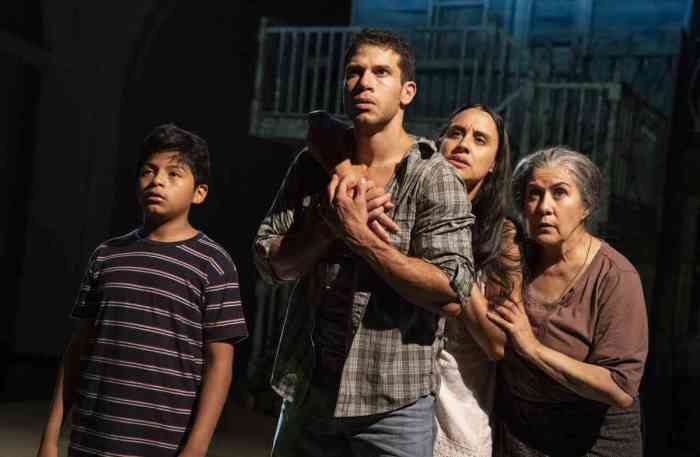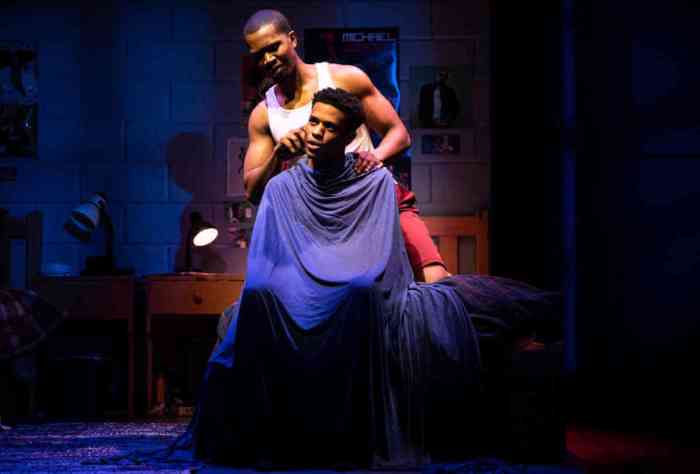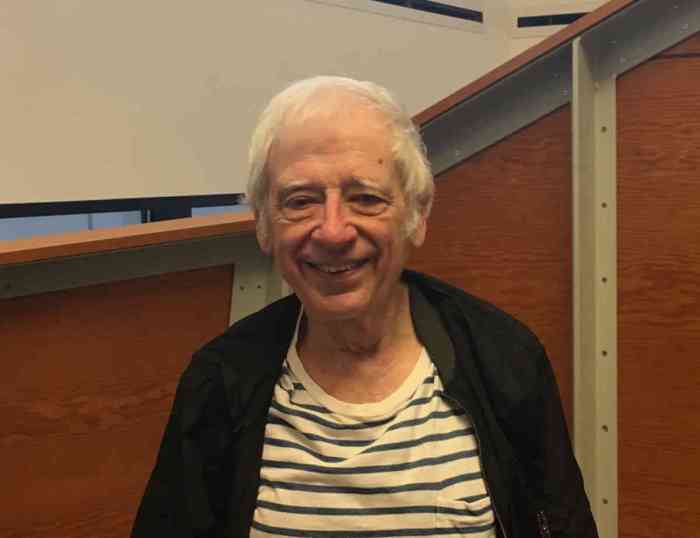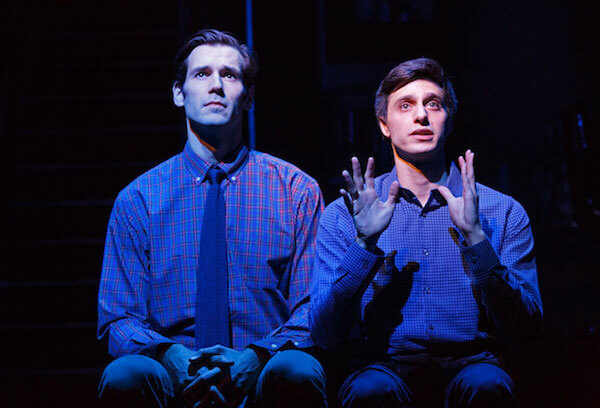Lauren Ambrose and Harry Hadden-Paton in Barlett Sher's production of “My Fair Lady” at Lincoln Center. | JOAN MARCUS
If you’re going to go to the trouble of mounting a sprawling, expensive production of a classic warhorse musical like “My Fair Lady,” you had better have something to say if you don’t want it to end up with a museum piece. Fortunately, director Bartlett Sher does, and the resulting production at Lincoln Center is refreshing, incisive, and sumptuously entertaining.
Sher’s production reveals itself as an enduring Shavian work of social criticism — it’s based on Shaw’s play “Pygmalion”— rather than merely a framework for glittering renditions of 60-year-old standards like “I Could Have Danced All Night,” “Get Me to the Church on Time,” and “Why Can’t the English?” As he did in his direction of “South Pacific” and “The King and I,” Sher emphasizes the characters and their humanity. And so, the story of elocutionist Henry Higgins who transforms the cockney flower girl Eliza Doolittle into an apparent princess simply by changing her speech and behavior acquires an edge — and a poignancy — that make it relevant and novel, regardless of how familiar one might be with the show.
With a slightly altered book, Sher puts the focus on class mobility and the inherent falsity of social structures — then determined by breeding, today more by economics. Sher’s Eliza is not just a puppet or an experimental subject. She has her own values and dignity, and the central conflict is not whether Higgins can pass her off as upper class but rather whether Eliza can survive when her identity is stripped away and a new one applied to her. That she does — and thrives — is more a tribute to her essential self than an ability to properly aspirate an “h.”
Eliza trumps Higgins, Harry Potter still has it, and that guy in the lobby wants to prove his stuff
As gorgeous as this production is with spectacular costumes by Catherine Zuber and sets by Michael Yeargan, and as lush as the music sounds, what stands out is the way the characters inhabit their social strata and the conflict of their collision. The fact that Harry Hadden-Paton as Higgins and Lauren Ambrose as Eliza are close in age adds electricity to their sparring. Hadden-Patton’s comparative youth elevates Higgins from the traditional portrait of a pedantic curmudgeon to a passionate man eager to prove his theories. Love, when it comes, takes him by surprise, bursting his academic bubble. When his humanity forces him to challenge his ideas as so much sophistry, it’s touching and endearing. Hadden-Patton give a commanding performance. He sings well and is blithely unaware of his sex appeal, something not lost on Eliza.
Ambrose inhabits Eliza with richness and depth, giving a subtle and complex performance and singing beautifully. We feel as much as see that her transformation has on some level stripped her of her dignity and agency, and that’s Shaw’s most cutting criticism of women’s place in the class structure. In the final moments, though, Eliza shows us that the essence of the flower girl is the secret to her success.
The supporting cast includes Norbert Leo Butz doing a fine turn as Eliza’s father Albert and Diana Rigg as Higgins’ mother. Allan Corduner is solid as Colonel Pickering, the man who humanizes Higgins — a bit. Jordan Donica is excellent as Freddy Eynsford-Hill, the kind of romantic gentleman that Shaw (and Higgins) deplore for adding nothing to the world. Donica sings “On the Street Where You Live” with wonderful passion, but Sher gives it a kind of irony that is very appropriate.
This is no mere revival, it’s a savvy rethinking and if you think you don’t need to see another production of “My Fair Lady,” you should think again.
My grandmother who was born in 1890 remembered seeing Maude Adams in “Peter Pan” and the sensation created when Peter flew over a field of flowers — all of which were individual light bulbs. At the dawn of the 20th century, New York had never such stagecraft, and it created a sensation.
“Harry Potter and the Cursed” child, a two-part extravaganza at the Lyric, where it will most likely play into the 22nd century, is causing a similar reaction, 113 years after Maude flew. “Harry Potter” is a triumph of jaw-dropping, breathtaking theatrical magic. You will believe that the world of Hogwarts is real.
Jamie Parker and Sam Clemmett in J.K. Rowling, Jack Thorne, and John Tiffany's “Harry Potter and the Cursed,” directed by Tiffany, at the Lyric Theatre. | MANUEL HARLAN
Thank Heaven for the magic, because the play at the center of the experience, like the books that it’s based on, is overstuffed with plot and incident, and if you are not steeped in the mythos of Hogwarts or you haven’t seen all the movies, you may, in fact, be quite lost in the tale. Writing credits are shared by book author J.K. Rowling, Jack Thorne, and director John Tiffany, and that may account for the lack of cohesion in the story. A lot of it feels forced. Characters appear, or are mentioned, with very little introduction, and while the Potter fans scream in delighted recognition at each nod and reference to plot points from the eight books in the series, including the one this is based on, there isn’t much of a dramatic arc to the piece. Not that they don’t try: Harry and his son Albus are locked in a kind of Oedipal drama, while dark forces may once again threaten the magical world. Beyond that, we’ve been expressly requested not to reveal the plot twists, which are legion. In fact, by the mid-point of the second play, twisting fatigue sets in, leaving one wishing that a spell be cast to move things along.
This is, of course, blasphemy to Potter fans who are besotted with every syllable of Rowling’s bloated prose, obvious characters, and conventional morality. Rowling, after all, is a purveyor of mass market fiction, so other than entertaining storylines it has never made literary pretensions. And while artistic and commercial success are not the same thing, the fans who will keep this running don’t make that distinction. It is thrilling, but in the way of a theme park ride, not like great theater.
Still, for its sheer magnitude and ingenious staging, this show probably should not be missed. The cast, many of whom were imported from the London original company, give their all in countless different parts. Jamie Parker as Harry, Sam Clemmett as Albus, and Alex Price as Draco Malfoy are particularly good, especially when enlivening some of the more ponderous, talk-heaven scenes. The real wizards, though, are director Tiffany, set designer Christine Jones, movement director Steven Hoggett, lighting designer Neil Austin, and, especially, sound designer Gareth Fry. They bring this world to life so spectacularly that it’s an easy bet you’ll tell your grandchildren about this experience — if not take them to see it.
“Lobby Hero,” Kenneth Lonergan’s 2001 play now getting a gripping revival by Second Stage, is a striking morality play for our time. Unlike a Medieval morality play where characters who deviate from the scriptural, or at least dogmatic, path suffer all kinds of torment, in Lonergan’s world morality is far more fluid and situational. What makes the play are the conflicting ethical constructs each of the characters confronts in choices between self-preservation and their own beliefs. What’s truly remarkable about this 2001 piece is how immediate it feels in an age of “post-truth” and “alternate facts.”
Chris Evans, Bel Powley, Michael Cera, and Brian Tyree Henry in Kenneth Lonergan’s “Lobby Hero,” directed by Trip Cullman at the Helen Hayes through May 13 only. | MARK SELIGER
Each of the four characters has a challenge. Jeff is a new security guard in an apartment building eager to prove himself. William his boss is a taskmaster, always on the lookout for a slip-up. Bill is a seasoned cop comfortable taking liberties with the ethical guidelines of his job, while his rookie partner Dawn is trying to prove herself in her new role, something she’s dreamed of all her life. The characters individually face a choice about doing the right thing that will ultimately alter the course of their life. This could become merely polemical were the characters not so finely drawn. Here, the lobby of a nondescript apartment building takes on a metaphoric sheen, one that becomes reminiscent of Sartre’s empty room in “No Exit.”
Trip Cullman directs with a sure hand and an emphasis on effortless naturalism. Each of the characters is at once sympathetic and maddening, and the performances are finely orchestrated. The company includes Brian Tyree Henry as William, who is extraordinary in a detailed performance that can tell a whole story just in the way he shrugs off a coat. Bel Powley is wonderful as Dawn, marvelously playing the dichotomy between the authority of her position and her own insecurities. Chris Evans, making his Broadway debut after appearing as Captain America in a slew of Marvel movies, is excellent providing nuance and depth to Bill. Michael Cera as Jeff, the lobby hero of the title, gives a deceptively complex performance. His final moral choice is perhaps the most difficult of all, and Cera’s portrayal of the man who wants more than anything to do what’s good and right is quietly shattering. His final tragedy is the realization that there are no absolutes, so one must do what one can to survive. It’s not an overly original dramatic conceit, but as told here, the tale is fresh, engaging, and undeniably powerful.
MY FAIR LADY | Vivian Beaumont Theater, Lincoln Center, 150 W. 65th St. | Tue., Thu. at 7 p.m.; Wed., Fri.-Sat at 8 p.m.; Wed., Sat. at 2 p.m.; Sun. at 3 p.m. | $97-$187 at telecharge.com or 212-239-6200 | Two hrs., 55 mins., with intermission
HARRY POTTER AND THE CURSED CHILD | Lyric Theater, 213 W. 42nd St. | Part 1: Wed., Sat., Sun. at 2 p.m.; Thu. at 7:30 p.m.; Part 2: Wed., Fri.-Sun. at 7:30 p.m. | $20-$299 per part at Harrypotter/ticketmaster.com or 800-653-8000 | Each part: two hrs., 45 min., with intermission
LOBBY HERO | Helen Hayes Theatre, 240 W. 44th St. | Through May 13 only: Tue., Thu. at 7 p.m.; Wed., Fri.-Sat. at 8 p.m. : Wed., Sat. at 2 p.m.; Sun. at 3 p.m. | $99-$169; telecharge.com or 212-239-6200 | Two hrs., 15 mins., with intermission




































